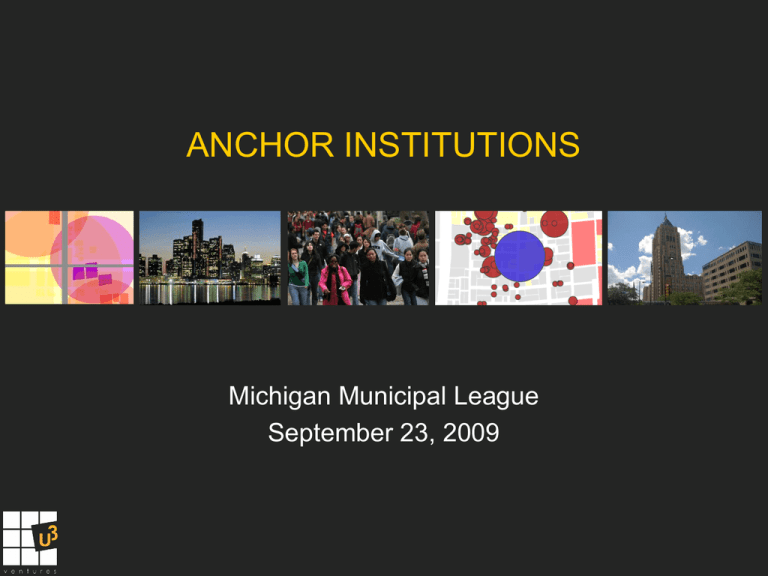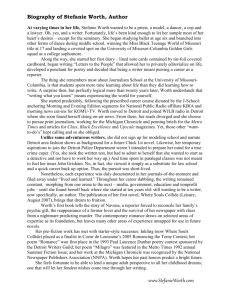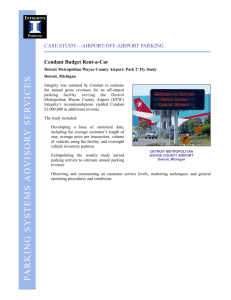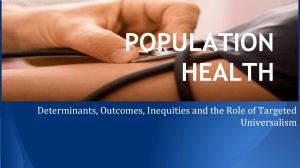U3 Ventures - Michigan Municipal League
advertisement

ANCHOR INSTITUTIONS Michigan Municipal League September 23, 2009 Examining the Relationship • Anchors’ role in the intellectual life of cities is well understood – Relationship with community/city/region has shifted from Town-Gown to Economic Engine – Today commonly identified as part of a city’s narrative and a point of civic pride • Less understood: – Economic impact – Industry and business creation – How they shape the built environment – Influence the Social Fabric at the Understanding the Interdependencies • The business of Higher Education: – – – – Employment Base Procurement of Goods Capital Investment Generator of Service Economy • Institutions are major land and property owners • Institutions attract significant research funding • Impact both supply and demand side of real estate Anchor Strategies • Community Builders • Planners and Developers • Engines for Driving Economic Growth A Community Builder Dr. Martin Luther King Library, San Jose State University Dr. Martin Luther King Library, San Jose The King Library is the library for San José State University and the Main Branch of the City of San José Library System Opened August 1, 2003 Project cost of $177.5 million was shared by the State of California, the City of San José Redevelopment Authority, San José State University, and private fundraising Planner / Developer The University of Pennsylvania Penn in the early 90’s By the early 1990’s West Philadelphia and the University faced a multitude of problems – Crime – Migration to Center City – Alienation from community – Deteriorating neighborhood …and moving forward By rediscovering its historic relationship with the City, Penn energized the full potential of its academic and institutional resources to both contribute to a great city and sustain a vibrant urban campus. Building on a shared vision Penn, along with community partners, developed the West Philadelphia Initiatives to improve the University City neighborhood: – Make neighborhoods safe and secure – Attract a year-round housing community – Develop destinations for shopping, dining, and entertainment – Invest in public education – Integrate the Campus into the urban fabric Mixed Use And Retail The University has embraced a strategy to attract a diverse mix of businesses to campus • University Square: 300,000 sf, $90 million mixed-use development composed of national retailers • 40th Street: a retail corridor connecting campus and community, built around a mix of local businesses, community amenities, international cuisine, and cultural and entertainment venues Market Rate and Student Housing • • • • Left Bank, $70 million Domus, $100 million The Hub, $23.5 million 3900 walnut, $75 million Commercial and Entertainment The Bridge Cinema, $53 million Translational Research Laboratory, $75 million WXPN / World Café, $13 million An Engine for Economic Growth Detroit Neighborhood Anchors, Detroit, Michigan Context • Detroit needs a new strategy to address disinvestment and deteriorating socio-economic conditions • Foundations have assumed a leadership role in neighborhood sustainability and revitalization • Right-sizing will reduce the City’s footprint, requiring the identification of viable districts • Declining public, private, and philanthropic resources requires a more effective decision-making process • Despite such challenges, anchor institutions continue to exhibit stability and growth HIGHER EDUCATION Lewis CollegeMarygrove of Business College University of Detroit - Mercy Wayne County Community College (Eastern Campus) Wayne County Community College (Northwest Campus) College for Creative Studies UDM School of Dentistry WCCC Wayne State (Downtown University Campus) UDM School of Law STUDENTS ~300 4,652 2,756 ~3,500 31,016 1,358 ~3,500 736 355 ~3,500 Total: 51,673 students Sources: University representatives & websites, IPEDS HEALTHCARE DMC SinaiGrace Hospital Detroit Hope Hospital Henry Ford Hospital System St. John / Conner Creek Village St. John Hospital & Medical Center Detroit Medical St. John Detroit Center Riverview Hospital HOSPITAL BEDS 804 404 ~120 751 1,300 Sources: Hospital representatives and websites, American Hospital Association, U3 Ventures modeling Total: 3,379 beds EMPLOYMENT ~90 ~720 5,036 2,432 204 ~230 ~720 ~230 450 9,532 8,115 8,045 ~60 ~110 ~230 Sources: Hospital & University representatives and websites, IPEDS, American Hospital Association, U3 Ventures modeling Total Direct Employment: 36,200 Employees OPERATING BUDGET _~$2 $84 $508 $331 $34 ~$20 ~$127 ~$20 $33 $1,276 $2,060 $1,740 ~$10 ~$6 ~$20 Sources: Hospital & University representatives and websites, IPEDS, American Hospital Association, U3 Ventures modeling Total Direct Expense: $6.4 Billion STUDENT RESIDENTIAL CAPTURE • Analyzed three institutions: – Marygrove College – University of Detroit – Mercy – Wayne State University Students Employees 39,094 2,725 % living in Detroit 34% 30% % living 1 mile from Campus 13% 9% Total Number • Over 32,000 students and employees living outside of Detroit • Represents $211 million in discretionary income leaked outside city limits GOODS AND SERVICES PURCHASED • Anaylzed three major Detroit anchors: – Wayne State University – Detroit Medical Center – Henry Ford Hospital • All goods and services purchased: $1.8 Billion • Purchased in Detroit: $257 Million • 84% of all purchases leaked outside of Detroit HIGHER EDUCATION REGIONAL POPULATION (July 1, 2005) RANK 1 2 3 4 5 6 7 8 9 10 11 12 13 14 15 16 17 18 19 20 21 22 23 24 25 Source: Impact of Higher Education in Greater Philadelphia by Select Greater Philadelphia (2007) TOTAL ENROLLMENT (2005/06) RANK 1 2 3 4 5 6 7 8 9 10 11 12 13 14 15 16 17 18 19 20 21 22 23 24 25 Source: Impact of Higher Education in Greater Philadelphia by Select Greater Philadelphia (2007) – Derived from IPEDS BACHELOR’S DEGREES OR HIGHER AWARDED (2004/05) RANK 1 2 3 4 5 6 7 8 9 10 11 12 13 14 15 16 17 18 19 20 21 22 23 24 25 Source: Impact of Higher Education in Greater Philadelphia by Select Greater Philadelphia (2007) – Derived from IPEDS R&D FUNDING PER STUDENT (Federal, State and Local, Industry, and other, in millions – 2005/06) RANK 1 2 3 4 5 6 7 8 9 10 11 12 13 14 15 16 17 18 19 20 21 22 23 24 25 Source: Impact of Higher Education in Greater Philadelphia by Select Greater Philadelphia (2007) Derived from National Science Foundation CORE EXPENDITURES PER STUDENT RANK (University operating expenses in millions 2005/06) 1 2 3 4 5 6 7 8 9 10 11 12 13 14 15 16 17 18 19 20 21 22 23 24 25 Source: Impact of Higher Education in Greater Philadelphia by Select Greater Philadelphia (2007) – Derived from IPEDS & Surveys % OF STUDENTS FULL-TIME (2005/06) RANK 1 2 3 4 5 6 7 8 9 10 11 12 13 14 15 16 17 18 19 20 21 22 23 24 Source: Impact of Higher Education in Greater Philadelphia by Select Greater Philadelphia (2007) – Derived from IPEDS HEALTHCARE Population Michigan 10,000,000 Detroit Metro 4,425,000 Wayne County City of Detroit 1,950,000 912,000 9% of Michigan's Population Source: Detroit Medical institution Representatives; American Hospital Association HEALTHCARE Hospital Beds Michigan 25,540 Detroit Metro 10,720 Wayne County City of Detroit 5,212 3,379 13% of Michigan's Hospital Beds Source: Detroit Medical institution Representatives; American Hospital Association HEALTHCARE Hospital Employees Michigan 164,300 Detroit Metro Wayne County City of Detroit 67,130 34,700 25,900 16% of Michigan's Hospital Employees Source: Detroit Medical institution Representatives; American Hospital Association HEALTHCARE Operating Budget (in millions) Michigan $21,200 Detroit Metro Wayne County City of Detroit $9,825 $5,510 $4,275 20% of Michigan's Hospital Budget Source: Detroit Medical institution Representatives; American Hospital Association EXAMPLE: MIDTOWN ANCHOR DISTRICT Detroit: Midtown Cleveland: University Circle Pittsburgh: Oakland Indianapolis Canal District EXAMPLE: MIDTOWN ANCHOR DISTRICT INPUTS Ed’s 12,451 32,300 40,805 70% Med’s 485,404 524,533 536,180 77% Culture 550,000 Population 1,800,000 5,231 19,285 82% OUTPUTS Density 100% 22,458 6,750 8,600 26,000 10% Income $21,500 30,100 0% Age 36 23 0% Education 30% 0% 63% RECOMMENDATIONS • Within the anchor districts, programs to “ live, buy and hire local” should be initiated and institutionalized – definition, sizing and institutionalizing of local programs within each anchor – creating a sustainable structure to collaborate between anchors – provide an infrastructure of support through CDCs to meet the demand generated by Local Programs • Anchor district projects must be managed and coordinated holistically – institutional changes – physical interventions – comprehensive set of support services • Midtown has the greatest potential to redefine Detroit with eventual economic benefit for all neighborhoods Leveraging Local Impact • Live Local, Buy Local, Hire Local • Creating desirable neighborhoods • Increasing economic impact – 7% of total vendors from Detroit – 16% of dollars spent with vendors from Detroit • Increasing capture in Detroit means – $28 million with 10% increase – $71 million with 25% increase – $142 million with 50% increase Conclusion Engaged anchors form a strong and mutually beneficial bond with neighborhoods and cities For the anchor, engagement helps produce more enlightened community enhances the opportunity for “real and impact-ful” institution provides greater opportunity to disseminate its intellectual discourse to the public For a City, an engaged institution anchors a neighborhood providing a long term and sustainable employer, developer and citizen creates a unique district that integrates academic life in the public realm





